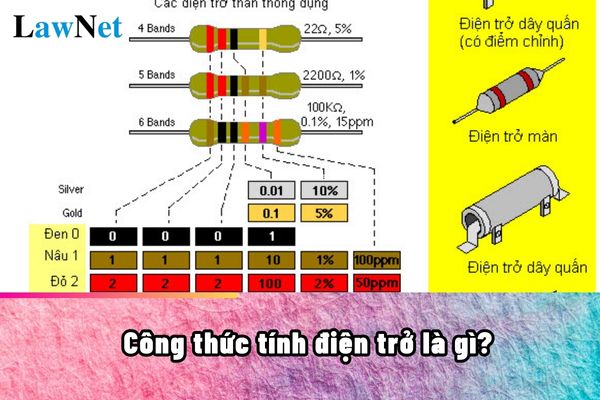What is the formula for calculating resistance? When do students in Vietnam learn about the formula for calculating resistance?
What is the formula for calculating resistance?
Students can refer to the formula for calculating electrical resistance below:
|
Formula for Calculating Resistance R = U/I *Where: R = ρ * L / S *Where: |
*Note: The information is for reference only./.

What is the formula for calculating resistance? When do students in Vietnam learn about the formula for calculating resistance? (Image from Internet)
When do students in Vietnam learn about the formula for calculating resistance?
According to Section 4 of the Physics education program in the General Education Program issued together with Circular 32/2018/TT-BGDĐT, the content in the grade 11 Physics program is specified as follows:
Electric circuits and resistance
- Define resistance, the measuring unit of resistance, and state the main causes of resistance.
- Sketch and discuss the I-U characteristic curve of a metallic conductor at a specific temperature.
- Briefly describe the effect of temperature on the resistance of incandescent bulbs and thermistors.
- State Ohm's Law for metallic conductors.
- Define electromotive force in terms of the energy required to move a unit charge around a closed circuit.
- Describe the effect of the internal resistance of a power source on the voltage between the source's terminals.
- Compare electromotive force and voltage.
- Discuss, design, or select and implement a method to measure the electromotive force and internal resistance of a battery using practice tools.
Thus, based on the above regulations, students will learn the resistance calculation formula in the grade 11 Physics program.
What are approaches for the 2018 General Education Physics Program in Vietnam?
According to Section 2 of the Physics education program in the General Education Program issued together with Circular 32/2018/TT-BGDĐT, the approach to the 2018 General Education Physics Program is as follows:
The Physics subject program fully implements the basic provisions stated in the General Program, regarding viewpoints, objectives, required outcomes, educational plans, educational content, teaching methods and result assessment, as well as implementation and program development conditions; it guides the construction of subject and educational activity programs; and emphasizes the following points:
(1). The Physics subject program, on one hand, inherits and promotes the advantages of the current program, and on the other, incorporates the experience of program construction in countries with advanced education systems worldwide, while also integrating educational science and physics science achievements in a manner suitable to students' cognitive, psychological, and physiological levels, taking into account Vietnam's economic and social conditions.
(2). The Physics subject program focuses on the core essence and physical significance of objects, emphasizing practicality; avoids mathematics-centric tendencies; enables teachers to assist students in developing scientific thinking from a physics perspective, inspires students' interest, and enhances the ability to apply physics knowledge and skills in practice.
Themes are designed and arranged from concrete to abstract, simple to complex, from a single particle system to multiple particles; initially, it approaches some modern, practical, and essential content.
(3). The Physics subject program is developed in an open manner, reflected in the absence of detailed regulations on teaching content, but only specifying the required student outcomes; only providing specific definitions for concepts in cases where there are various interpretations.
Based on the required outcomes, textbook authors are proactive and creative in implementing the specific teaching content for program development.
On the basis of closely adhering to objectives and meeting the required outcomes of the Physics Program, teachers can choose to use one or combine multiple textbooks and various resources to teach.
Within a class, the order of teaching topics (including mandatory and elective topics) is not fixed in a "rigid" manner, allowing textbook authors and teachers to reasonably innovate, provided it does not disrupt the logic of knowledge and skill formation, nor does it limit the opportunity to form and develop students' qualities and capabilities.
The sequence for teaching topics is such that the topic describing the physical phenomenon is addressed first to provide an overall picture of the phenomenon, followed by the topic explaining and researching the phenomenon to supply deeper physical foundations, and then the topic applying that phenomenon in science or practice.
(4). The teaching methods of the Physics subject contribute to promoting learner's activeness and creativity, aiming to form and develop physics competence as well as contribute to forming and developing general qualities and competencies stipulated in the General Program.
Thus, the 2018 General Education Physics Program will be developed in an open manner.

